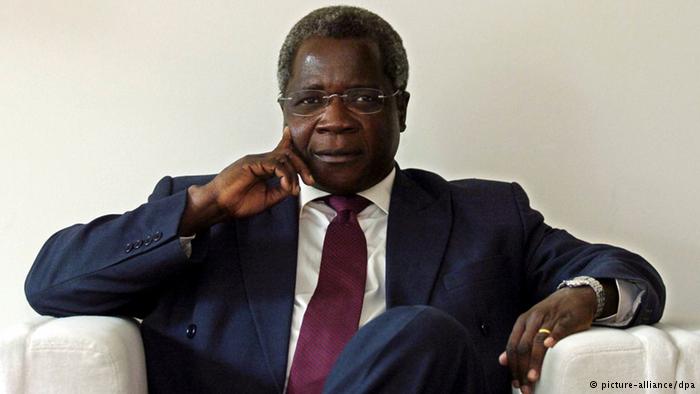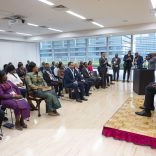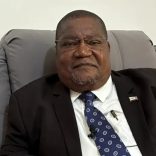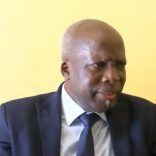Mozambique: Mondlane confirms party's approval, calls for celebration - Watch
Dhlakama has faith in the resumption of good relations between the IMF and Maputo

DW / Afonso Dhlakama
Renamo leader Afonso Dhlakama believes that Mozambique’s financial crisis can be overcome as long as the Frelimo government shows goodwill. But ending the war is the main objective, he says. An International Monetary Fund (IMF) mission has been in Maputo since Thursday 1 December to start discussions about a new support program. In April, the IMF suspended aid to Mozambique following the discovery of state-guaranteed hidden debts valued at around EUR 1.2 billion. The last IMF mission to the country – in June – noted government progress in managing the case. DW Africa sought the opinion of Afonso Dhlakama, leader of the county’s largest opposition party (RENAMO), on the subject.
DW Africa: The Mozambican economy is in crisis and the consequences of this are already visible in price increases and currency devaluation. There is much discontent within the population, including the middle class. What is your expectation regarding the outcome of this case which has set the Mozambican Government and the IMF at loggerheads?

Afonso Dhlakama (AD): It is a very difficult question, but I will answer because I am Mozambican, and I was born, studied and grew up here, so I know the situation.
Everything has a solution if there is goodwill on Frelimo’s side. For example, we are talking about debt, not the debt which is responsibility of the Mozambican state, it is the debt of the known people who went to get money in the banks there in Switzerland, in Europe, buying things. And the signatures [of those people] are there in the banks. So here is a mix of things, but the International Monetary Fund wants to do an audit to identify the people [responsible] and see the measures and the rulers have already accepted it. There are voices against it, but this is how to encourage the IMF to again believe in this country, which is called Mozambique.
On this subject, Europe and the friends of international cooperation may even sympathise and come en masse to – I do not say to forgive the debt, [because] those responsible for the debts will be punished and held accountable – but at least European and American companies could trust Mozambique again. All this needs peace; only this way can investment be encouraged.
For example, the currency is undervalued because there is no production. Mozambique survives by the outstretched hand. There are no exports and the currency cannot be strong when the country is fed on imports. It is necessary to produce, to have companies to produce, to see that tourism, agriculture, industry, fishing etc are reinvigorated so that our currency, the metical, can regain its value.
 Now, I do not want to take my sardines off the coals, but I think the solution, in the first instance, is to end the armed conflict and have a national reconciliation. Frelimo accepts that there should be strong state institutions that are not instruments of Frelimo, that there is a rule of law and a governmental alternation. This is what the world wants to see, because it guarantees investments. But if Frelimo wants to continue drag the war out because it is afraid that, with stability in the country, some of these people will end up in prison… because they are scared. While the war continues, they remain camouflaged. But we are putting on the pressure.
Now, I do not want to take my sardines off the coals, but I think the solution, in the first instance, is to end the armed conflict and have a national reconciliation. Frelimo accepts that there should be strong state institutions that are not instruments of Frelimo, that there is a rule of law and a governmental alternation. This is what the world wants to see, because it guarantees investments. But if Frelimo wants to continue drag the war out because it is afraid that, with stability in the country, some of these people will end up in prison… because they are scared. While the war continues, they remain camouflaged. But we are putting on the pressure.
DW Africa: From the social point of view, what do you expect in the medium term, especially in urban areas? Do you think people will go out onto the streets or settle down? Because the difficulty of access to food and other things is serious, and growing.
AD: It is not as easy as in Germany, France, Portugal or the USA. The institutions themselves do not encourage civil society to hold demonstrations which, in fact, put pressure on the regime. They can have a silent march, but those demonstration where people speak out harsh words do not happen because they know people get shot and die, and no-one wants to die. That is why I do not believe that demonstration is the solution in Mozambique’s case.
The solution is that the war ends, for people to start walking and marketing products in distant rural areas so that they can reach urban standards, and gradually the situation will change. I continue to maintain that a Mozambique without war, with good economic policies and with investment, can be one of the richest countries in Southern Africa, because it has resources that have not yet been explored.

DW Africa: Some time ago it was said that Vale’s trains were used to transport weapons for the Defence and Security Forces of Mozambique and that Renamo would have intercepted these trains and seized the weapons. Can you confirm this?
AD: We didn’t get to seize anything. We just frightened them a bit and, out of fear, they stopped. I can confirm that.
DW Africa: But were they transporting weapons?
AD: It is not easy to see a weapon being transported. Any regime could do that, but it would be harmful. The trains of the Brazilians, which carry coal from Moatize to ports in Nacala or Beira, [may] do that. It gives the regime power to continue the war if it thinks it has allies who will carry their material on trains. There Renamo did not forgive and frightened them a little and the trains stopped. They are not even loading the trucks, just one or two.













Leave a Reply
Be the First to Comment!
You must be logged in to post a comment.
You must be logged in to post a comment.